The word globalization has been defined as a situation in which available goods and services, or social and cultural influences, gradually become similar in all parts of the world. In such a globalized world, demand for a common universal language seems obvious, and many people believe it is English, which is best suitable for fulfilling this criteria. Things have come to such a pass ,that in many Asian countries (including India) many parents even talk to their children in English & not in their own mother tongue, even in home. When a child starts speaking, English language from an early age ; most of the parents are overjoyed and find it a big achievement. But how useful, is it really & what is the final effect on society? Is English as first language, really helpful?
10% of Indians can understand and speak English in everyday situations, with limited proficiency and only 1% can do so with mastery over the language. Of course, the benefits of knowing English is visible everywhere. The medium of teaching in technical teaching institutions & all institutes of higher education, is English. Proficiency of speaking English is needed for getting good jobs both in the private sector (& Multi National Companies ) and also in the government sector. Something as simple as going for dinner, entails a basic knowledge of English, for the simple need to read the menu card. Things have come to such a pass that, even the labels of the medicine bottles are written in English & we are not even talking about the need for going outside the country ; like many people do for higher studies and jobs, where the knowledge of English is mandatory.
Like majority of problems in the Indian subcontinent, this conundrum regarding use of language in educational institutes and government offices was started by the British Imperialists, during pre independence days. The governing authorities of colonial era, were themselves divided regarding, which language was better suited for education purpose, in a country ,which was totally different from them. Some believed that, the Indian languages like Sanskrit/Persian were best suited for Indian people (the orientalists) ; and then there were people like Macaulay, who had no faith in the traditional Indian methods, which he considered were outdated for the modern world and he believed that, only the English language/education can provide the right direction. These group of people were called utilitarians/ anglicists .
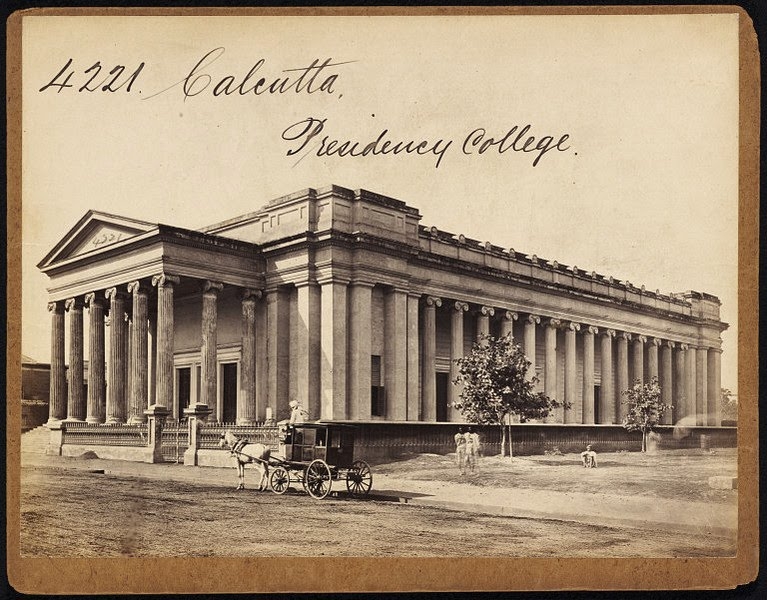
It was the effort of Macaulay, to produce a category of westernised Indians, who would serve as an intermediate level of communication between the English master’s and the ordinary Indian citizens ; that English education was first introduced in India. There were also people like governor general Lord Bentinck, who wanted English to replace Persian, as an official language & medium of education. The English education act was passed in 1835, which gave an official sanction to the governor general’s idea, and instructed the East India Company to provide funds for expenditure for education in India. Sir Charles Wood’s despatch on education, in 1854 was another turning point, which declared that the educational policy of the government was for teaching and spreading western education. As a part of this decision ; Calcutta, Madras & Bombay Universities were founded. All these events, slowly paved the way for English to become the medium for higher studies and all official functions.
The question which inevitably rises is, what is the status of English as a language in the world & in India? If we consider the top 5 language, spoken in the world, depending on the number of people speaking them ; we find that the topmost place goes to Mandarin (Chinese), followed second by Spanish, then comes English, followed by Hindi & Arabic respectively. That table is easy to understand, considering that China is the most populous country in the world, followed by India, where people speak different languages, depending their original state/province, to which they belong.
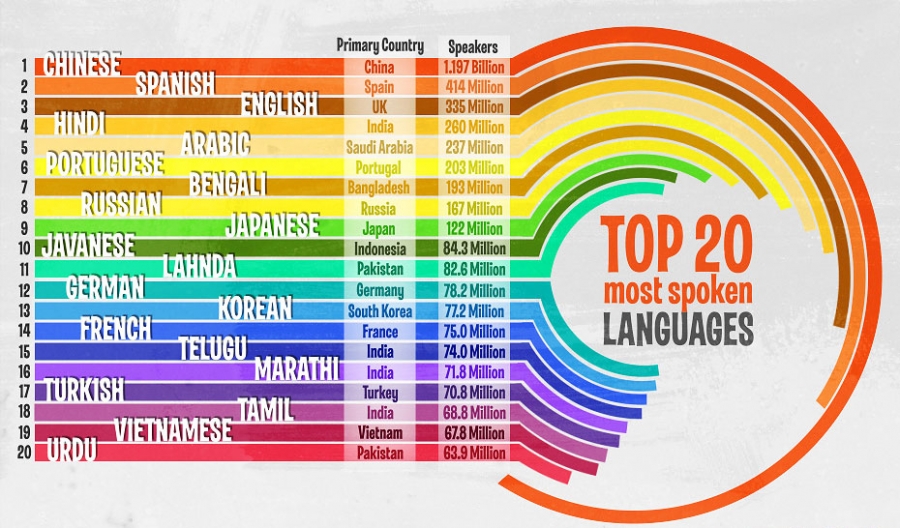
In the Indian context, depending on the number of native speakers, Hindi is on the top ; but the Official language act of 1963, declares 22 major languages in India, as official languages of India. The list includes English and Sanskrit also. In spite of lot’s of confusion, the fact remains that Hindi is not the national language of India and in fact there is no language, which has been given the status of national language in India.
The absence of any definite national language, gives rise to many chaotic thought process. Hindi, which has the largest following in India, is not encouraged by governments in Southern part of the country. In contrast to popular misconception, any traveller, who is originally from North India & goes to South, will find it extremely difficult to communicate with the people, specially in the rural areas, where even knowledge of English is rudimentary (like villages elsewhere in the country), so the question of English serving as a bridge, to cover the cultural gap, is totally baseless.

Languages like Urdu, Punjabi, Gujarati & Marathi are similar to Hindi & so can be considered it’s brother languages. Bengali, Assamese and Odia are very similar hence can be considered as brother languages. South Indian language are totally separate from the examples mentioned previously. This situation creates, the need for a language, which is known to all the people in the country & equally acceptable to all, but unfortunately neither political nor social consensus, have been achieved till date in India, to reach a viable solution.
India has a rich history, which goes back 6000 years old. It had a glorious civilization of Harappa & Mohenjo-Daro, which were the earliest planned cities in the world, and had the world’s first sewage system. India was the only source of diamonds, till it’s discovery in Brazil in 18th century. An Indian saint & physician Susruta, is credited with invention of plastic surgery ( even westerners consider him as father of plastic surgery) and Cataract surgery in 6th century BC. The oxford illustrated companion to medicine mentions that leprosy & cures for it was first described in Atharva Veda(1200BC). The ancient system of medicine – Ayurveda, originated in India.
Binary numbers were described by Pingala in 200 BC. The decimal system was developed in India in 100 BC. The numeral zero and value of pi was also given by Aryabhatta from India. Bhaskaracharya calculated the time taken by Earth to orbit the Sun, much before Galileo faced roman inquisition & punishment for heliocentric theory (the theory stating --earth and planets revolve around the sun) .The first university of the world – Takshashila university (which had 10,000 students and 200 professors ), was founded on 700 BC in north-western India in Takshashila. Religions like Buddhism & Jainism, originated in India. Also the game of chess originated in India. India gave the sweet flavour to the world, as the crystallized sugar from sugarcane was first produced here during reign of ancient Gupta dynasty, the knowledge of which was later transmitted to China. Buttons, shampoos & Ink were also invented in India.

India has a rich cultural heritage & having diverse language and culture, just enhances it’s richness. Bengali, which is the language, spoken by people of eastern province of West Bengal, was the language of the poet Rabindranath Tagore, the first Asian to win Nobel Prize in year 1913 for literature. Gitanjali was a collection of poems in Bengali, whose English translation was the main reason, Tagore got the prize. The book was very popular in west & was widely translated. Rabindranath Tagore, is also the only person in history to write national anthem of two different countries – India and Bangladesh. He also inspired the Sri Lankan composer, Ananda Samarakoon, to write the national anthem of SriLanka. Tamil, a South Indian language, is another classical language, that has rich tradition, that goes back thousands of years. Great writers like Ghalib, Iqbal & Faiz have written some great compositions in Urdu, which still moves our soul.
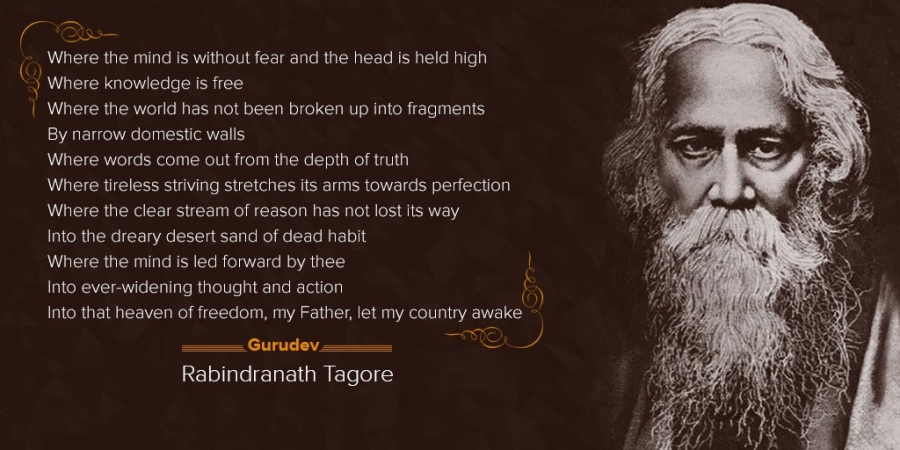
Many of our cultural heritage are closely linked to their linguistic background. Ramayana and Mahabharata, the main Hindu epics were written in Sanskrit. Ramayana was translated & written in different languages like --- Tamil by poet Kamban; in Telegu by Ranganatha ; in Malayalam by poet Thunchaththu Ezhuthachan ; in Kannada by poet Toraveya Narahari & in Awadhi by saint Tulsidas.
Every state has different cultural heritage, different dance forms is just, one of it’s part. Some of the important ones are – Kathak( Uttar Pradesh), Odissi (Odisha), Manipuri (Manipur), Sattriya (Assam), Bharatnatyam (Tami- -lnadu & Karnataka), Kathakali ( Kerala), Mohiniattam (Kerala), Kuchipudi (Andhra Pradesh), Bhangra (Punjab), Giddha (Punjab), Sirmour Nati Dance (Himachal Pradesh), Garba & Dandiya (Gujarat), Ghoomar (Rajasthan) and Bihu (Assam) to just name a few.
It is no doubts, that the years of childhood, are the most important formative years for any person. It is quite often seen, that parents are talking to children in homes & also outside, in English. Although it is quite understandable, that parents are concerned about the future of the children, where they can’t envision bright future aspects for them, without the knowledge of English language. The ability to speak English, has become synonymous with being smart & intelligent. While these concerns of parents are rightly placed to some extent, but care should be taken that the child should not become oblivious to his/her heritage, & thereby compromising his/her identity.
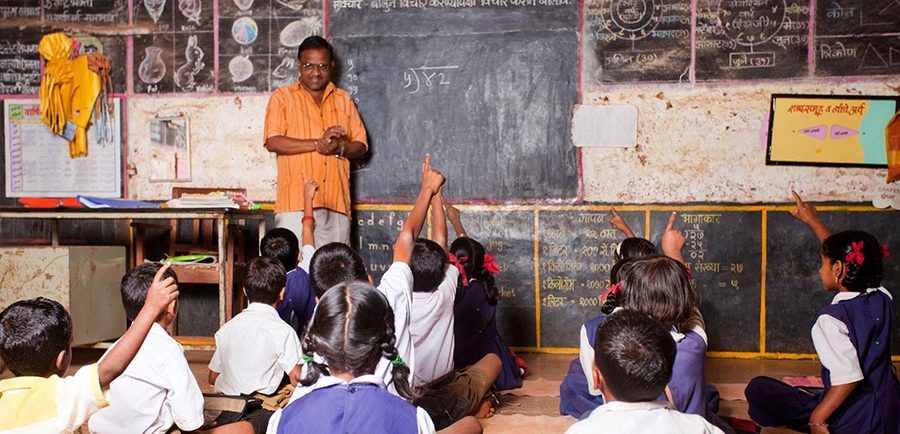
It is no doubt, that the western world has progressed tremendously as far as scientific advances & economic prosperity is concerned (Although a lot of that is directly related to imperialism, industrial revolution & the new world order, favouring certain nationalities ), but still family values & cultural richness has always been the forte, of the east. Here children do household chores, as an integral part of being in the family ; and not for incentives (like getting paid). Most of the children stay with their parents (irrespective of their age), till they move out for job prospects or for getting married.
The family doesn’t encompass just a person’s spouse & children, but grandparents, uncle & aunties and even distant relatives are included ; in many places even neighbour are addressed as uncle & aunty. Somehow the concept of addressing a grown up person/ old person, by a young kid as Mr/ Mrs ---, somehow looks offensive in our culture. The children should learn about the Indian culture and value system from their early childhood, so when the time comes later on they can transmit, the values to next generation. Inability to do so, would give rise to a generation of youth, who would be just a second rate copycat of the westerners & a mindless zombie, without any self identity.
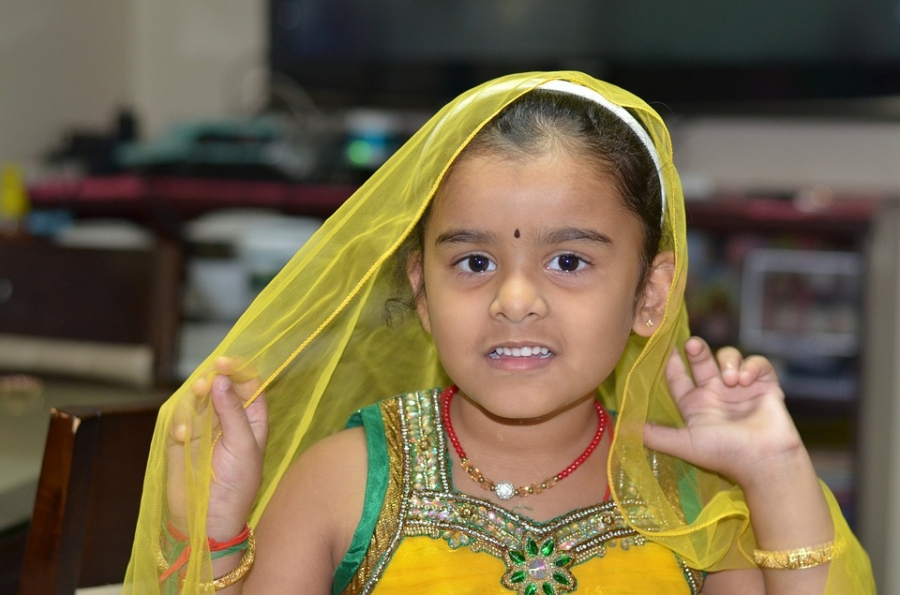
Many people may object to the above mentioned facts, that learning a language has nothing to do with the culture or moral values, a person follows in life ; but the facts remains that, the first language a child learns & which he/she speaks in the home, certainly creates a lasting impression on the mindset of an individual. Language is more than just a means of communication. Language is invariably linked to a certain culture of it’s people. It determines, which books a person reads, the ideas that a person imbibes, the program on television a person watches, the values he/she follows & a person’s interest ; by influencing all these things, it finally determines a person’s identity. So if proper emphasis on the mother tongue / other regional language is not given, then our culture would slowly die, as the next generation would not have read the authors of regional language, or heard about the regional freedom fighters, who sacrificed everything for our freedom; & they may not even give importance to the social reformers who worked at local level, and to whom we owe our modern – Enlighted present India & slowly our rich historical achievements of our ancestors may become irrelevant and immaterial to them.
In a globalized world, where everything happening everywhere, reaches our home via television, internet and social media ; reaching the right balance between achieving development, but still preserving a distinct identity, may sometimes be like walking on a tightrope. But in the same context, international companies like Google, Facebook and multiple other companies also empowers the regional languages, by offering their services in those languages.
Consensus should be developed to ensure, that every child should first learn his/her mother tongue as first language(and basics of the associated culture & literature), and only after that English should be introduced, as a second language. This pattern is followed in many countries in the world, like – Finland, Italy, Egypt, Thailand, Greece, Sweden, Germany, Japan and many other countries.
In a country as diverse as ours, to achieve a substantial result, a coordinated efforts of regional as well as central governments would be needed, both in the educational front & in the job sector. Steps should be taken to ensure that people giving competitive examinations for higher education and employment, should have the option, of giving the examination in local language & not just in English; as English is just a language & certainly not a marker, to determine a person’s intelligence or capability.
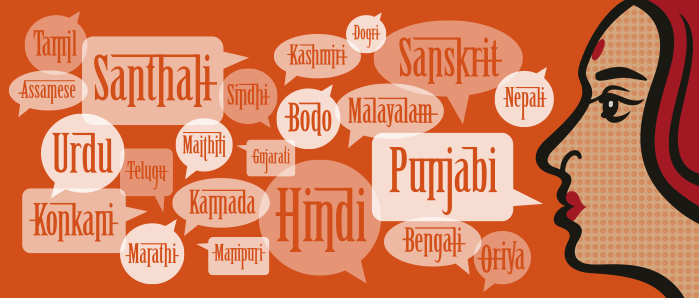
So the need of the hour is to teach multiple languages to the people from a young age in such a way; that the demands of a globalized world are met, while at the same time regional flair is not compromised. If this system is followed, then it would give rise to a new generation, which would be adept at taking care of themselves internationally, while maintaining their own distinct identity & preserving the rich national heritage ; for which Martin Luther King (Jr) once said – “ To other countries, I may go as a tourist, but to India, I come as a pilgrim”.
Also Read: Secrets of stupidity explained - Role of parents, school & society
Also Read: Hard to believe Strange News of 2018